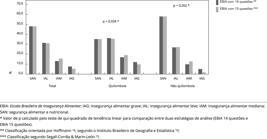Abstract:
This study aimed to measure the prevalence of food insecurity in a rural area of Northeast Brazil and investigate this outcome according to residence in quilombola communities (descendants of African slaves) versus non-quilombola communities. This was a cross-sectional study in 21 rural communities, 9 of which quilombolas, in 2014, using the Brazilian Food Insecurity Scale (EBIA). Prevalence rates and prevalence ratios were estimated for food insecurity, and Poisson multiple regression analysis with robust variance was performed. Food insecurity was found in 52.1% of the families: 64.9% in quilombola communities and 42% in the others. Food insecurity was associated with belonging to a quilombola community (PR = 1.25), lower economic status (PR = 1.89; 2.98, and 3.22 for status C2, D, and E, respectively), beneficiaries of Bolsa Família program (PR = 1.52), and four or more household members (PR = 1.20). Food insecurity prevalence was high in the entire population, but it was even higher in quilombola communities, even though they belonged to the same coverage area. The results emphasize this population’s vulnerability.
Keywords:
Food and Nutrition Security; African Continental Ancestry Group; Ethnicity and Health; Rural Population

 Thumbnail
Thumbnail
